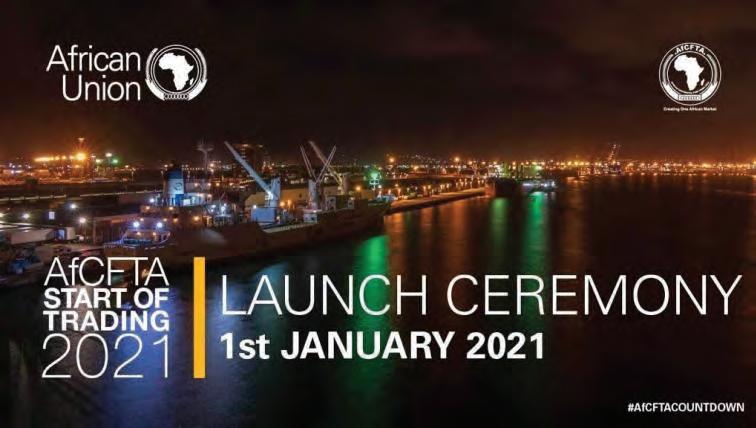
3 minute read
Africa Heralds Onset of Free-Trade Pact After
from DAWN
Africa Heralds Onset of Free-Trade Pact After Years of Talks By Monique Vanek
THE FIRST GOODS WILL begin to fl ow under an Africa-wide free-trade pact on Friday, January 1, 2021, the culmination of more than fi ve years of negotiations on cutting cross-border tariff s.
The accord comes to fruition at a time when trade tensions are rising across much of the rest of the world. The 55-nation Africa Union marked the occasion in a ceremony that came just hours after the U.K. left the European Union’s single market and a new post-Brexit trade agreement entered into force.
It’s “a day in which we take Africa a step closer to a vision of an integrated Africa, a vision of an integrated market on the African continent,” Wamkele Mene, the Secretary General of the African Continental Free Trade Area (AfCFTA), said during the event.
The treaty seeks to lower or eliminate cross-border tariff s on most goods, facilitate the movement of capital and people, promote investment and pave the way for a continent-wide customs union. The bloc has a potential market of 1.2 billion people with a combined gross domestic product of $2.5 trillion, and could be the world’s biggest free-trade zone by area when the treaty becomes fully operational by 2030.
The accord will assist the continent to recover from the “devastating impact” of the coronavirus pandemic, said South African President Cyril Ramaphosa, who holds the AU’s rotating chairmanship.
Intra-African trade fell to 14.5% of the total in 2019, from 15% the year before. The freetrade pact could bolster the proportion to 22%, and commerce within the continent could rise to more than $231 billion even if all other conditions remained unchanged, the African Export-Import Bank said in report published on Dec. 15. Internal shipments accounted for 52% of total trade in Asia and 72% in Europe, according to Afreximbank data.
All but one of the 55 nations recognized by the African Union have signed to join the area and more than half have ratifi ed the accord. Eritrea, which has a largely closed economy, is the sole holdout.
The pact will help Africa to industrialize on a big scale, said President Nana Akufo-Addo of Ghana, the host country of the bloc’s secretariat.
All outstanding issues relating to the bloc’s various operation instruments, such as an online platform for tariff negotiations and a digital payment and settlement system, would be fi nalized and made operational by the end of March, Akufo-Addo said.
www.msn.com/en-us/money/other/africa-heraldsonset-of-free-trade-pact-after-years-of-talks/arBB1copBa Image credit: giz.de
View the Launch Ceremony on YouTube: https://youtu.be/5HrckaRmPpM

ON 1ST JANUARY 2021 trading under the AfCFTA will start in Africa. This is a historic milestone for the continent as Africa will really start to trade with Africa. To mark the occasion, a lunch time ceremony including speeches by some African Union Heads of State and Government, representatives of development partners and the private sector as well as showing of videos on diff erent aspects of trade and development in Africa is being organised by the AfCFTA Secretariat. African citizens from all over the continent are invited to witness this historic and important event on New Year’s Day 2021.
Currently, the percentage of trade that African countries do with each other is a mere 16 - 18%. The bulk of the continent’s trade is with the rest of the world, and most African exports are in raw materials including extractive commodities like oil, gas and minerals which are vulnerable to market volatility.
Under AfCFTA trading, tariff s on various commodities where rules of origin have been agreed will be drastically reduced and traders of all sizes will have access to a much bigger market than they used to before. Non-tariff barriers (NTBs) to trade will also be addressed and a mechanism for speedy reporting and resolution of NTBs has been put in place (www.tradebarriers.africa). The bigger market will spur producers to upscale and so support increased industrialization and value addition on the continent. More employment opportunities will thus be generated for Africa’s burgeoning youth population.
It has already been demonstrated that to mitigate the Covid-19 pandemic medicines and personal protective equipment need to be produced and moved to where they are needed expeditiously. The AfCFTA will be a tool for mitigation of Covid-19 by allowing free and unhindered trade in health products across the continent. https://au.int/en/newsevents/20210101/afcfta-start-trading-ceremony-webinar










